ACCT 20074: Contemporary Accounting Theory and Corporate Crises
VerifiedAdded on 2023/01/04
|13
|3000
|50
Report
AI Summary
This report critically examines the relationship between corporate failures and the subsequent improvements in accounting regulations and standards. It analyzes how accounting practices and regulatory bodies have evolved in response to crises, drawing on journal articles and research to support the arguments. The report also provides a critical evaluation of the political influences that shape the accounting standard-setting process globally, particularly focusing on the role of political factors in the establishment and amendment of accounting standards. The study considers the influence of lobbying and the impact of regulatory changes on security mispricing and corporate information quality. It further explores the political dynamics surrounding international accounting standards and the challenges faced by standard setters in the face of political pressure, providing a comprehensive overview of the interplay between corporate failures, accounting regulations, and political factors.
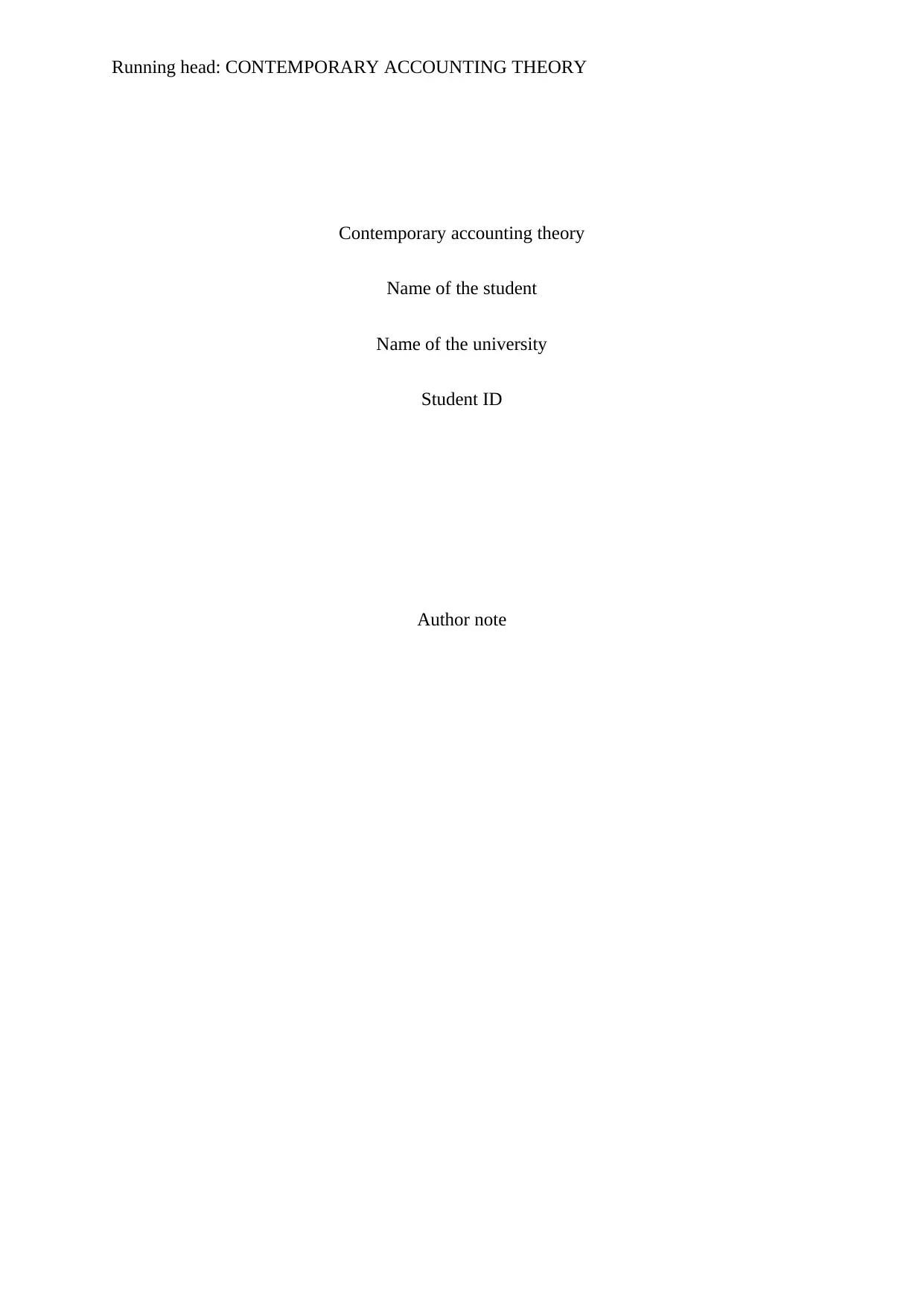
Running head: CONTEMPORARY ACCOUNTING THEORY
Contemporary accounting theory
Name of the student
Name of the university
Student ID
Author note
Contemporary accounting theory
Name of the student
Name of the university
Student ID
Author note
Paraphrase This Document
Need a fresh take? Get an instant paraphrase of this document with our AI Paraphraser
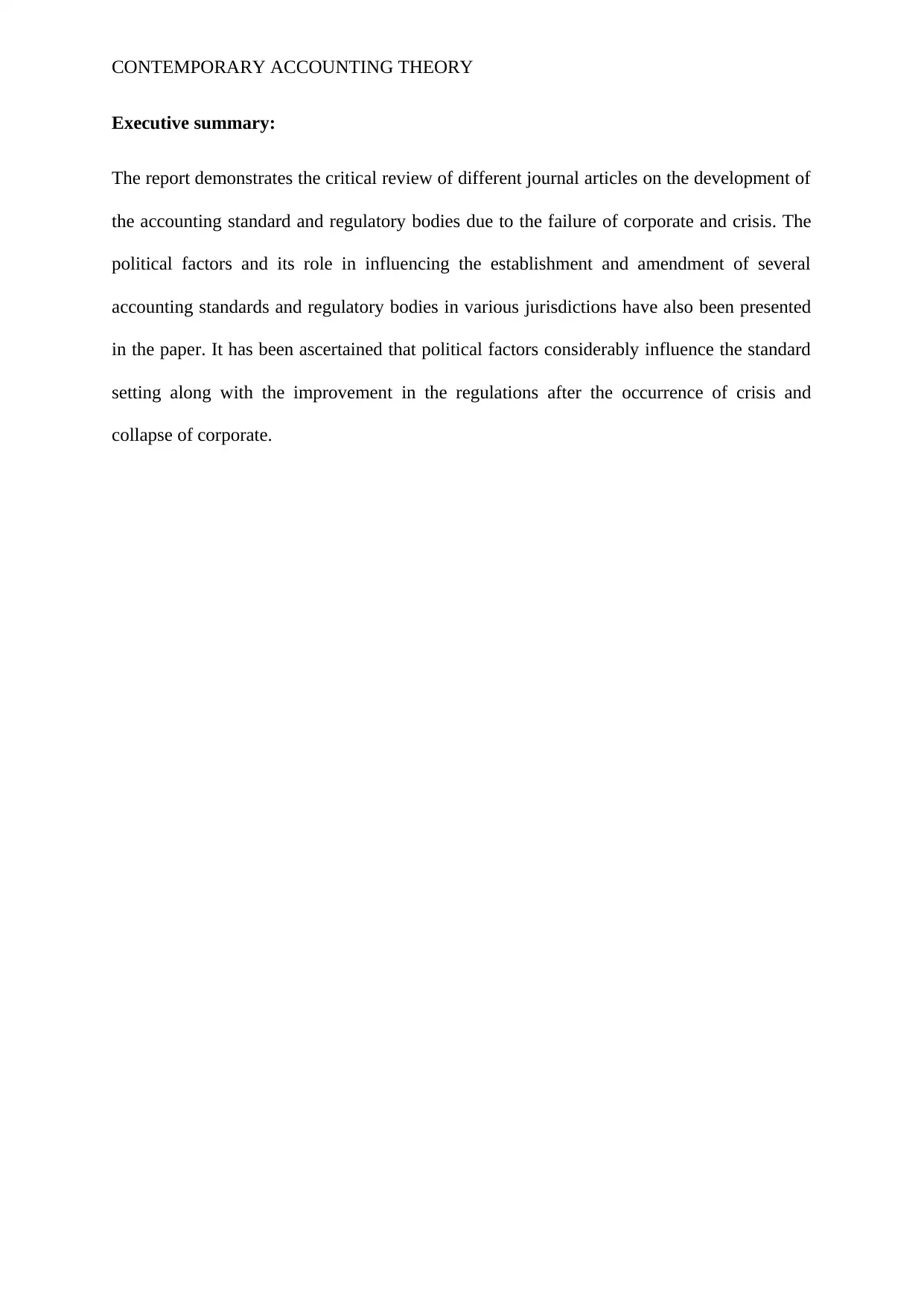
CONTEMPORARY ACCOUNTING THEORY
Executive summary:
The report demonstrates the critical review of different journal articles on the development of
the accounting standard and regulatory bodies due to the failure of corporate and crisis. The
political factors and its role in influencing the establishment and amendment of several
accounting standards and regulatory bodies in various jurisdictions have also been presented
in the paper. It has been ascertained that political factors considerably influence the standard
setting along with the improvement in the regulations after the occurrence of crisis and
collapse of corporate.
Executive summary:
The report demonstrates the critical review of different journal articles on the development of
the accounting standard and regulatory bodies due to the failure of corporate and crisis. The
political factors and its role in influencing the establishment and amendment of several
accounting standards and regulatory bodies in various jurisdictions have also been presented
in the paper. It has been ascertained that political factors considerably influence the standard
setting along with the improvement in the regulations after the occurrence of crisis and
collapse of corporate.
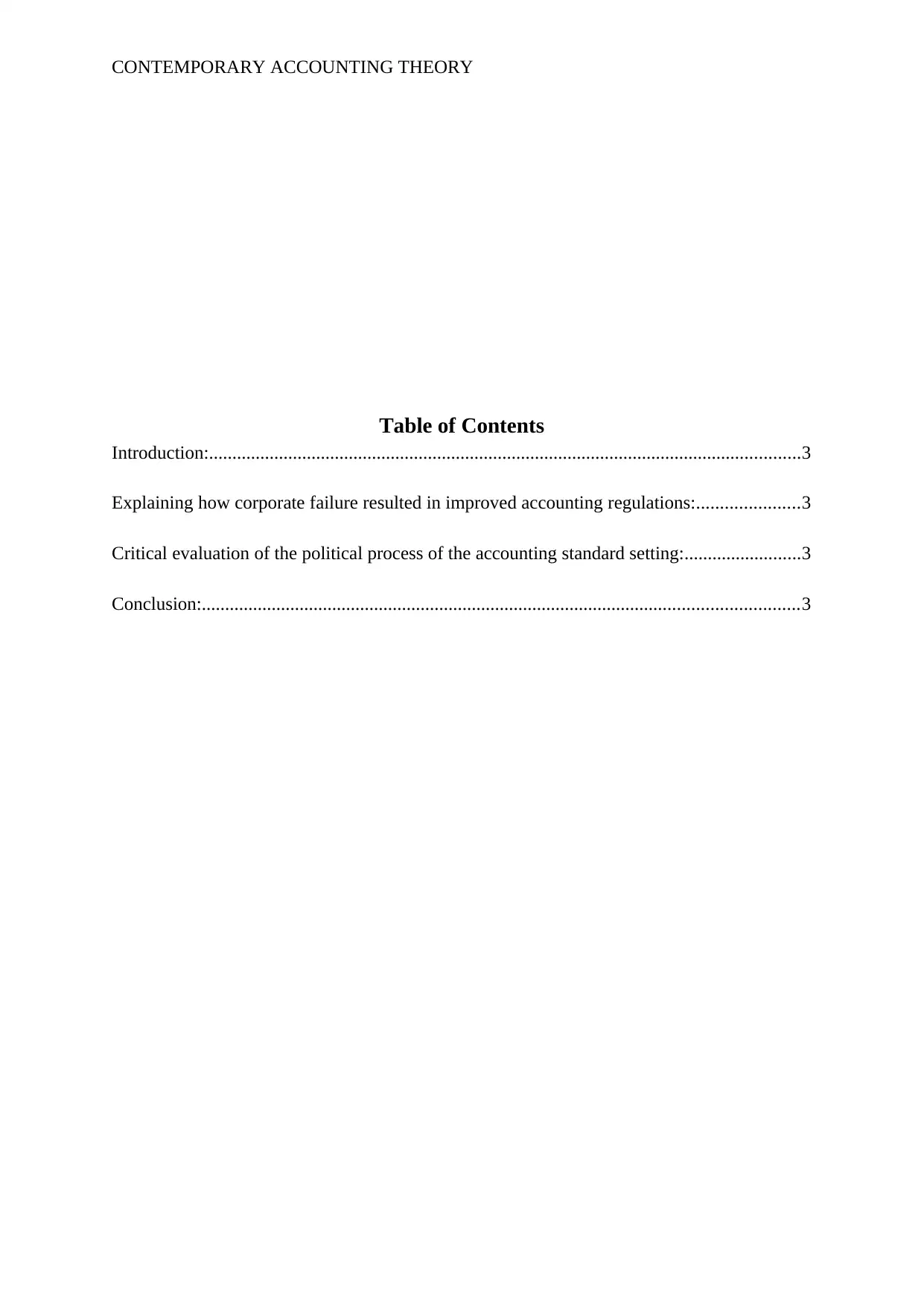
CONTEMPORARY ACCOUNTING THEORY
Table of Contents
Introduction:...............................................................................................................................3
Explaining how corporate failure resulted in improved accounting regulations:......................3
Critical evaluation of the political process of the accounting standard setting:.........................3
Conclusion:................................................................................................................................3
Table of Contents
Introduction:...............................................................................................................................3
Explaining how corporate failure resulted in improved accounting regulations:......................3
Critical evaluation of the political process of the accounting standard setting:.........................3
Conclusion:................................................................................................................................3
⊘ This is a preview!⊘
Do you want full access?
Subscribe today to unlock all pages.

Trusted by 1+ million students worldwide
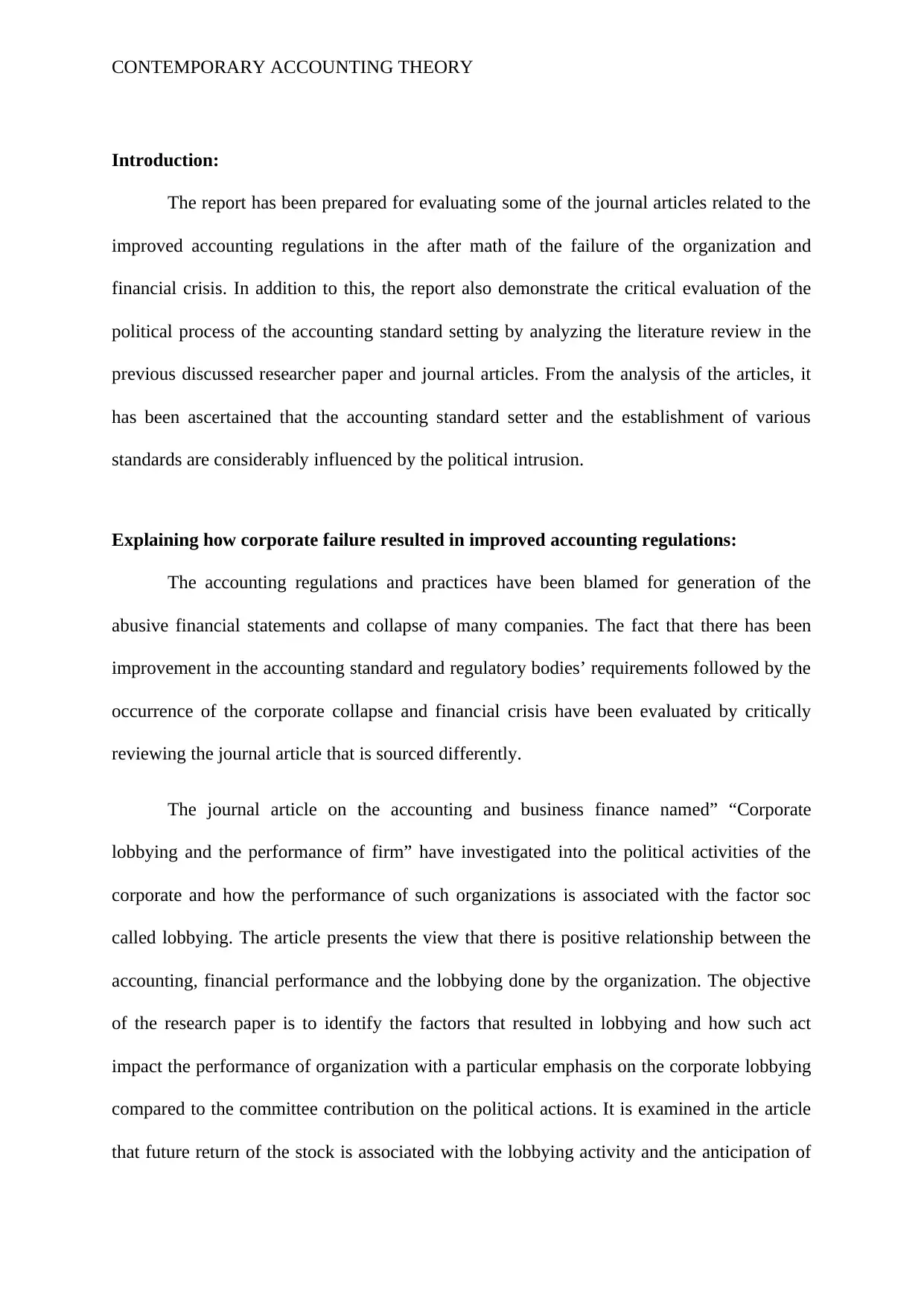
CONTEMPORARY ACCOUNTING THEORY
Introduction:
The report has been prepared for evaluating some of the journal articles related to the
improved accounting regulations in the after math of the failure of the organization and
financial crisis. In addition to this, the report also demonstrate the critical evaluation of the
political process of the accounting standard setting by analyzing the literature review in the
previous discussed researcher paper and journal articles. From the analysis of the articles, it
has been ascertained that the accounting standard setter and the establishment of various
standards are considerably influenced by the political intrusion.
Explaining how corporate failure resulted in improved accounting regulations:
The accounting regulations and practices have been blamed for generation of the
abusive financial statements and collapse of many companies. The fact that there has been
improvement in the accounting standard and regulatory bodies’ requirements followed by the
occurrence of the corporate collapse and financial crisis have been evaluated by critically
reviewing the journal article that is sourced differently.
The journal article on the accounting and business finance named” “Corporate
lobbying and the performance of firm” have investigated into the political activities of the
corporate and how the performance of such organizations is associated with the factor soc
called lobbying. The article presents the view that there is positive relationship between the
accounting, financial performance and the lobbying done by the organization. The objective
of the research paper is to identify the factors that resulted in lobbying and how such act
impact the performance of organization with a particular emphasis on the corporate lobbying
compared to the committee contribution on the political actions. It is examined in the article
that future return of the stock is associated with the lobbying activity and the anticipation of
Introduction:
The report has been prepared for evaluating some of the journal articles related to the
improved accounting regulations in the after math of the failure of the organization and
financial crisis. In addition to this, the report also demonstrate the critical evaluation of the
political process of the accounting standard setting by analyzing the literature review in the
previous discussed researcher paper and journal articles. From the analysis of the articles, it
has been ascertained that the accounting standard setter and the establishment of various
standards are considerably influenced by the political intrusion.
Explaining how corporate failure resulted in improved accounting regulations:
The accounting regulations and practices have been blamed for generation of the
abusive financial statements and collapse of many companies. The fact that there has been
improvement in the accounting standard and regulatory bodies’ requirements followed by the
occurrence of the corporate collapse and financial crisis have been evaluated by critically
reviewing the journal article that is sourced differently.
The journal article on the accounting and business finance named” “Corporate
lobbying and the performance of firm” have investigated into the political activities of the
corporate and how the performance of such organizations is associated with the factor soc
called lobbying. The article presents the view that there is positive relationship between the
accounting, financial performance and the lobbying done by the organization. The objective
of the research paper is to identify the factors that resulted in lobbying and how such act
impact the performance of organization with a particular emphasis on the corporate lobbying
compared to the committee contribution on the political actions. It is examined in the article
that future return of the stock is associated with the lobbying activity and the anticipation of
Paraphrase This Document
Need a fresh take? Get an instant paraphrase of this document with our AI Paraphraser
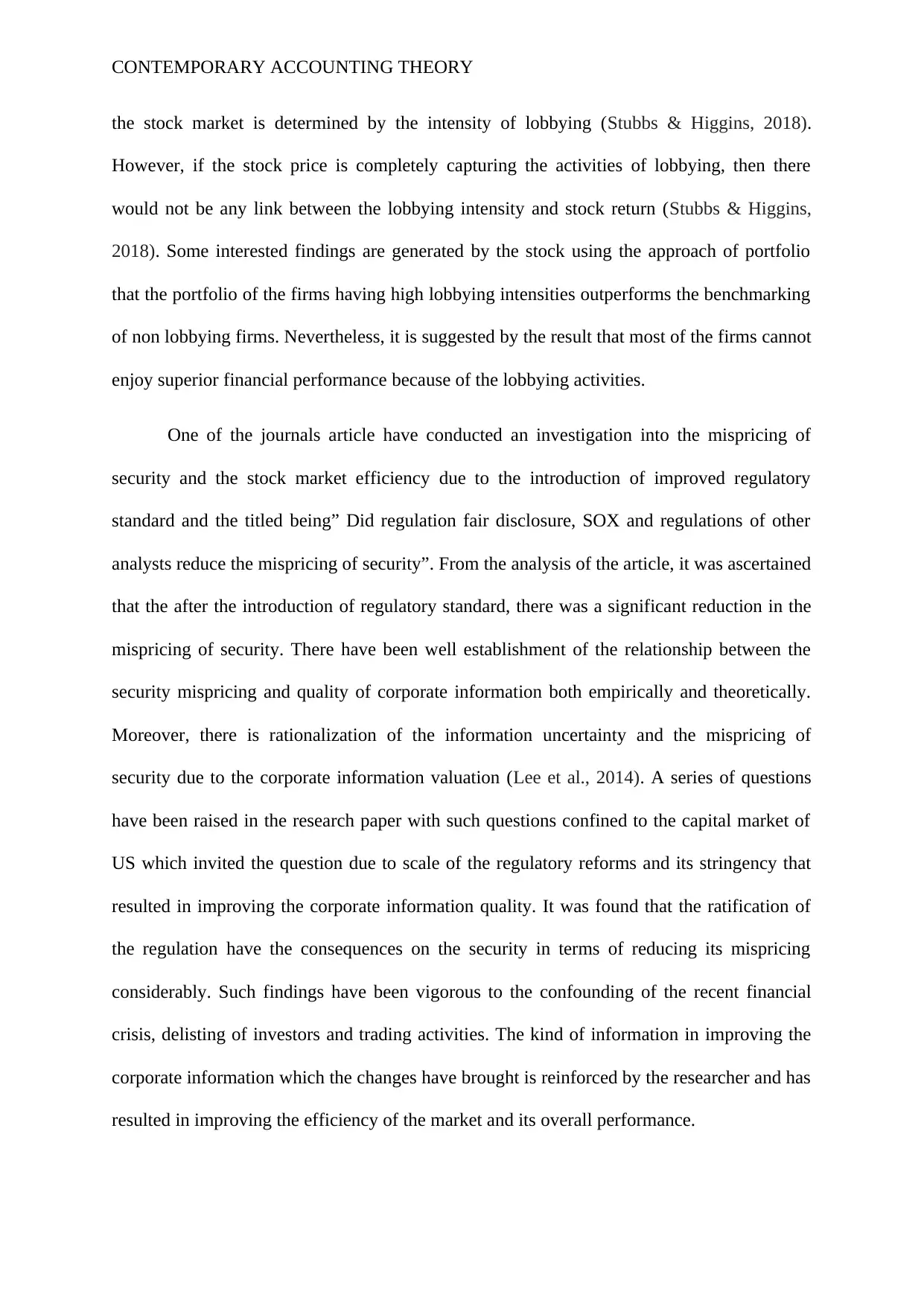
CONTEMPORARY ACCOUNTING THEORY
the stock market is determined by the intensity of lobbying (Stubbs & Higgins, 2018).
However, if the stock price is completely capturing the activities of lobbying, then there
would not be any link between the lobbying intensity and stock return (Stubbs & Higgins,
2018). Some interested findings are generated by the stock using the approach of portfolio
that the portfolio of the firms having high lobbying intensities outperforms the benchmarking
of non lobbying firms. Nevertheless, it is suggested by the result that most of the firms cannot
enjoy superior financial performance because of the lobbying activities.
One of the journals article have conducted an investigation into the mispricing of
security and the stock market efficiency due to the introduction of improved regulatory
standard and the titled being” Did regulation fair disclosure, SOX and regulations of other
analysts reduce the mispricing of security”. From the analysis of the article, it was ascertained
that the after the introduction of regulatory standard, there was a significant reduction in the
mispricing of security. There have been well establishment of the relationship between the
security mispricing and quality of corporate information both empirically and theoretically.
Moreover, there is rationalization of the information uncertainty and the mispricing of
security due to the corporate information valuation (Lee et al., 2014). A series of questions
have been raised in the research paper with such questions confined to the capital market of
US which invited the question due to scale of the regulatory reforms and its stringency that
resulted in improving the corporate information quality. It was found that the ratification of
the regulation have the consequences on the security in terms of reducing its mispricing
considerably. Such findings have been vigorous to the confounding of the recent financial
crisis, delisting of investors and trading activities. The kind of information in improving the
corporate information which the changes have brought is reinforced by the researcher and has
resulted in improving the efficiency of the market and its overall performance.
the stock market is determined by the intensity of lobbying (Stubbs & Higgins, 2018).
However, if the stock price is completely capturing the activities of lobbying, then there
would not be any link between the lobbying intensity and stock return (Stubbs & Higgins,
2018). Some interested findings are generated by the stock using the approach of portfolio
that the portfolio of the firms having high lobbying intensities outperforms the benchmarking
of non lobbying firms. Nevertheless, it is suggested by the result that most of the firms cannot
enjoy superior financial performance because of the lobbying activities.
One of the journals article have conducted an investigation into the mispricing of
security and the stock market efficiency due to the introduction of improved regulatory
standard and the titled being” Did regulation fair disclosure, SOX and regulations of other
analysts reduce the mispricing of security”. From the analysis of the article, it was ascertained
that the after the introduction of regulatory standard, there was a significant reduction in the
mispricing of security. There have been well establishment of the relationship between the
security mispricing and quality of corporate information both empirically and theoretically.
Moreover, there is rationalization of the information uncertainty and the mispricing of
security due to the corporate information valuation (Lee et al., 2014). A series of questions
have been raised in the research paper with such questions confined to the capital market of
US which invited the question due to scale of the regulatory reforms and its stringency that
resulted in improving the corporate information quality. It was found that the ratification of
the regulation have the consequences on the security in terms of reducing its mispricing
considerably. Such findings have been vigorous to the confounding of the recent financial
crisis, delisting of investors and trading activities. The kind of information in improving the
corporate information which the changes have brought is reinforced by the researcher and has
resulted in improving the efficiency of the market and its overall performance.
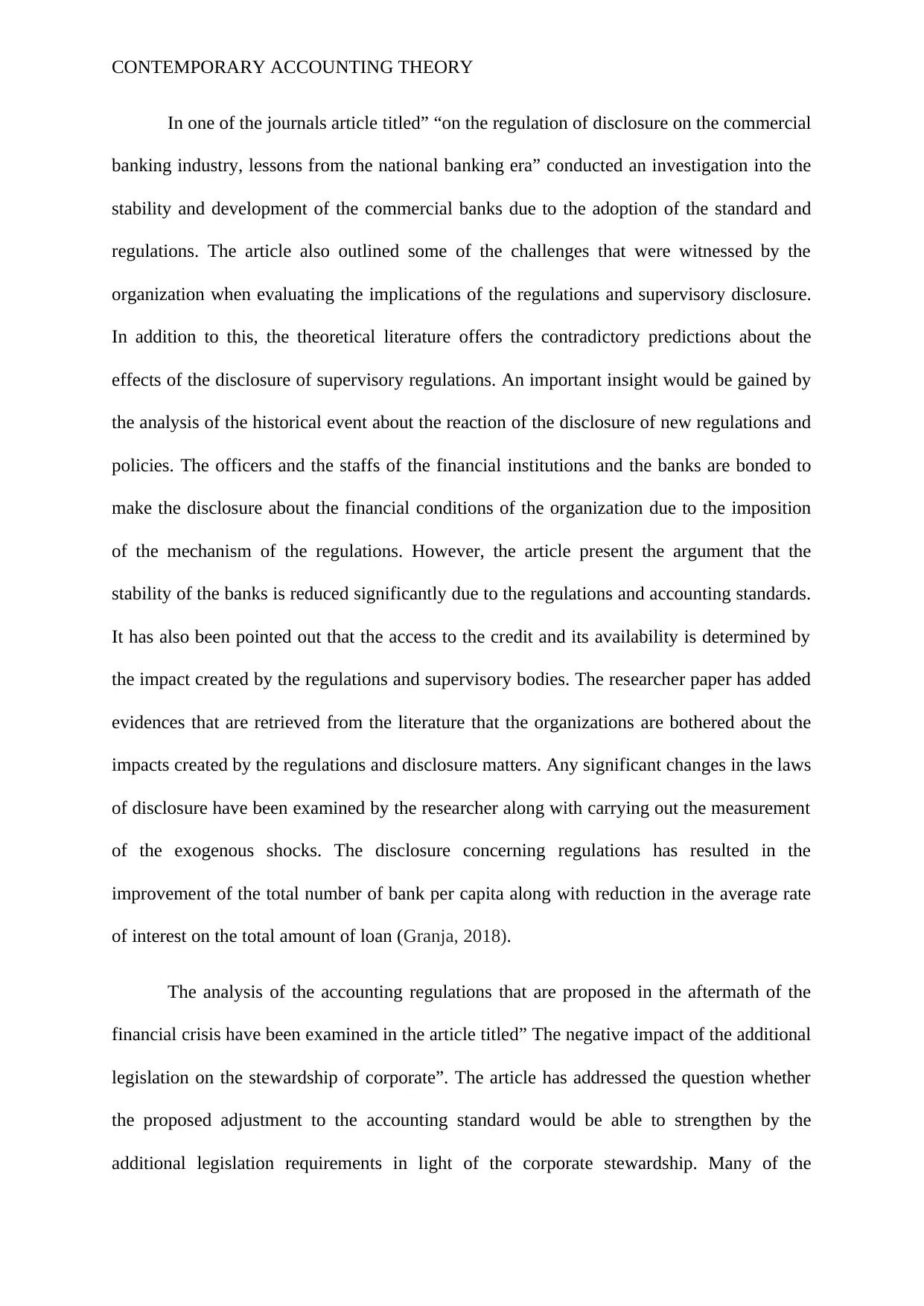
CONTEMPORARY ACCOUNTING THEORY
In one of the journals article titled” “on the regulation of disclosure on the commercial
banking industry, lessons from the national banking era” conducted an investigation into the
stability and development of the commercial banks due to the adoption of the standard and
regulations. The article also outlined some of the challenges that were witnessed by the
organization when evaluating the implications of the regulations and supervisory disclosure.
In addition to this, the theoretical literature offers the contradictory predictions about the
effects of the disclosure of supervisory regulations. An important insight would be gained by
the analysis of the historical event about the reaction of the disclosure of new regulations and
policies. The officers and the staffs of the financial institutions and the banks are bonded to
make the disclosure about the financial conditions of the organization due to the imposition
of the mechanism of the regulations. However, the article present the argument that the
stability of the banks is reduced significantly due to the regulations and accounting standards.
It has also been pointed out that the access to the credit and its availability is determined by
the impact created by the regulations and supervisory bodies. The researcher paper has added
evidences that are retrieved from the literature that the organizations are bothered about the
impacts created by the regulations and disclosure matters. Any significant changes in the laws
of disclosure have been examined by the researcher along with carrying out the measurement
of the exogenous shocks. The disclosure concerning regulations has resulted in the
improvement of the total number of bank per capita along with reduction in the average rate
of interest on the total amount of loan (Granja, 2018).
The analysis of the accounting regulations that are proposed in the aftermath of the
financial crisis have been examined in the article titled” The negative impact of the additional
legislation on the stewardship of corporate”. The article has addressed the question whether
the proposed adjustment to the accounting standard would be able to strengthen by the
additional legislation requirements in light of the corporate stewardship. Many of the
In one of the journals article titled” “on the regulation of disclosure on the commercial
banking industry, lessons from the national banking era” conducted an investigation into the
stability and development of the commercial banks due to the adoption of the standard and
regulations. The article also outlined some of the challenges that were witnessed by the
organization when evaluating the implications of the regulations and supervisory disclosure.
In addition to this, the theoretical literature offers the contradictory predictions about the
effects of the disclosure of supervisory regulations. An important insight would be gained by
the analysis of the historical event about the reaction of the disclosure of new regulations and
policies. The officers and the staffs of the financial institutions and the banks are bonded to
make the disclosure about the financial conditions of the organization due to the imposition
of the mechanism of the regulations. However, the article present the argument that the
stability of the banks is reduced significantly due to the regulations and accounting standards.
It has also been pointed out that the access to the credit and its availability is determined by
the impact created by the regulations and supervisory bodies. The researcher paper has added
evidences that are retrieved from the literature that the organizations are bothered about the
impacts created by the regulations and disclosure matters. Any significant changes in the laws
of disclosure have been examined by the researcher along with carrying out the measurement
of the exogenous shocks. The disclosure concerning regulations has resulted in the
improvement of the total number of bank per capita along with reduction in the average rate
of interest on the total amount of loan (Granja, 2018).
The analysis of the accounting regulations that are proposed in the aftermath of the
financial crisis have been examined in the article titled” The negative impact of the additional
legislation on the stewardship of corporate”. The article has addressed the question whether
the proposed adjustment to the accounting standard would be able to strengthen by the
additional legislation requirements in light of the corporate stewardship. Many of the
⊘ This is a preview!⊘
Do you want full access?
Subscribe today to unlock all pages.

Trusted by 1+ million students worldwide
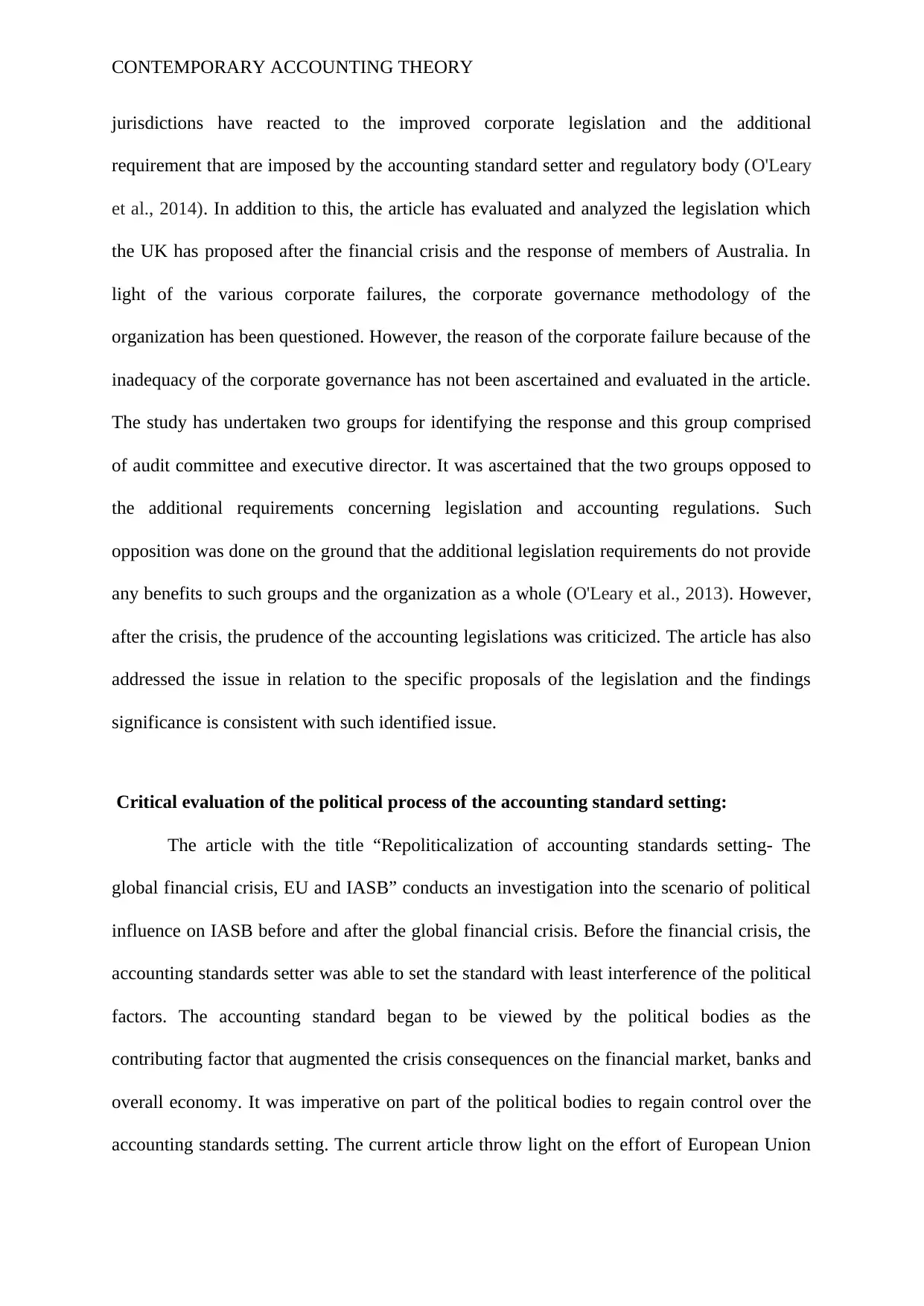
CONTEMPORARY ACCOUNTING THEORY
jurisdictions have reacted to the improved corporate legislation and the additional
requirement that are imposed by the accounting standard setter and regulatory body (O'Leary
et al., 2014). In addition to this, the article has evaluated and analyzed the legislation which
the UK has proposed after the financial crisis and the response of members of Australia. In
light of the various corporate failures, the corporate governance methodology of the
organization has been questioned. However, the reason of the corporate failure because of the
inadequacy of the corporate governance has not been ascertained and evaluated in the article.
The study has undertaken two groups for identifying the response and this group comprised
of audit committee and executive director. It was ascertained that the two groups opposed to
the additional requirements concerning legislation and accounting regulations. Such
opposition was done on the ground that the additional legislation requirements do not provide
any benefits to such groups and the organization as a whole (O'Leary et al., 2013). However,
after the crisis, the prudence of the accounting legislations was criticized. The article has also
addressed the issue in relation to the specific proposals of the legislation and the findings
significance is consistent with such identified issue.
Critical evaluation of the political process of the accounting standard setting:
The article with the title “Repoliticalization of accounting standards setting- The
global financial crisis, EU and IASB” conducts an investigation into the scenario of political
influence on IASB before and after the global financial crisis. Before the financial crisis, the
accounting standards setter was able to set the standard with least interference of the political
factors. The accounting standard began to be viewed by the political bodies as the
contributing factor that augmented the crisis consequences on the financial market, banks and
overall economy. It was imperative on part of the political bodies to regain control over the
accounting standards setting. The current article throw light on the effort of European Union
jurisdictions have reacted to the improved corporate legislation and the additional
requirement that are imposed by the accounting standard setter and regulatory body (O'Leary
et al., 2014). In addition to this, the article has evaluated and analyzed the legislation which
the UK has proposed after the financial crisis and the response of members of Australia. In
light of the various corporate failures, the corporate governance methodology of the
organization has been questioned. However, the reason of the corporate failure because of the
inadequacy of the corporate governance has not been ascertained and evaluated in the article.
The study has undertaken two groups for identifying the response and this group comprised
of audit committee and executive director. It was ascertained that the two groups opposed to
the additional requirements concerning legislation and accounting regulations. Such
opposition was done on the ground that the additional legislation requirements do not provide
any benefits to such groups and the organization as a whole (O'Leary et al., 2013). However,
after the crisis, the prudence of the accounting legislations was criticized. The article has also
addressed the issue in relation to the specific proposals of the legislation and the findings
significance is consistent with such identified issue.
Critical evaluation of the political process of the accounting standard setting:
The article with the title “Repoliticalization of accounting standards setting- The
global financial crisis, EU and IASB” conducts an investigation into the scenario of political
influence on IASB before and after the global financial crisis. Before the financial crisis, the
accounting standards setter was able to set the standard with least interference of the political
factors. The accounting standard began to be viewed by the political bodies as the
contributing factor that augmented the crisis consequences on the financial market, banks and
overall economy. It was imperative on part of the political bodies to regain control over the
accounting standards setting. The current article throw light on the effort of European Union
Paraphrase This Document
Need a fresh take? Get an instant paraphrase of this document with our AI Paraphraser
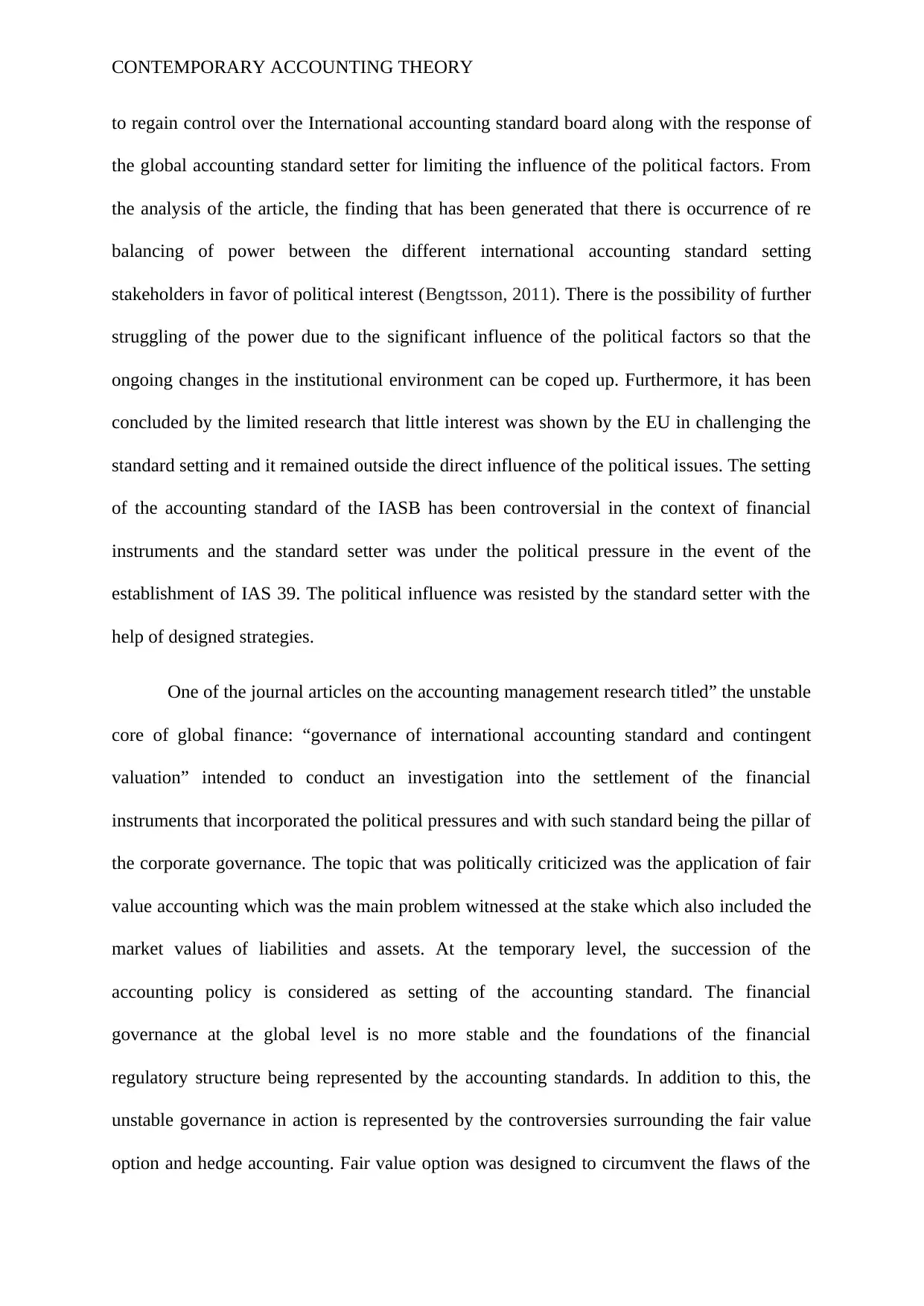
CONTEMPORARY ACCOUNTING THEORY
to regain control over the International accounting standard board along with the response of
the global accounting standard setter for limiting the influence of the political factors. From
the analysis of the article, the finding that has been generated that there is occurrence of re
balancing of power between the different international accounting standard setting
stakeholders in favor of political interest (Bengtsson, 2011). There is the possibility of further
struggling of the power due to the significant influence of the political factors so that the
ongoing changes in the institutional environment can be coped up. Furthermore, it has been
concluded by the limited research that little interest was shown by the EU in challenging the
standard setting and it remained outside the direct influence of the political issues. The setting
of the accounting standard of the IASB has been controversial in the context of financial
instruments and the standard setter was under the political pressure in the event of the
establishment of IAS 39. The political influence was resisted by the standard setter with the
help of designed strategies.
One of the journal articles on the accounting management research titled” the unstable
core of global finance: “governance of international accounting standard and contingent
valuation” intended to conduct an investigation into the settlement of the financial
instruments that incorporated the political pressures and with such standard being the pillar of
the corporate governance. The topic that was politically criticized was the application of fair
value accounting which was the main problem witnessed at the stake which also included the
market values of liabilities and assets. At the temporary level, the succession of the
accounting policy is considered as setting of the accounting standard. The financial
governance at the global level is no more stable and the foundations of the financial
regulatory structure being represented by the accounting standards. In addition to this, the
unstable governance in action is represented by the controversies surrounding the fair value
option and hedge accounting. Fair value option was designed to circumvent the flaws of the
to regain control over the International accounting standard board along with the response of
the global accounting standard setter for limiting the influence of the political factors. From
the analysis of the article, the finding that has been generated that there is occurrence of re
balancing of power between the different international accounting standard setting
stakeholders in favor of political interest (Bengtsson, 2011). There is the possibility of further
struggling of the power due to the significant influence of the political factors so that the
ongoing changes in the institutional environment can be coped up. Furthermore, it has been
concluded by the limited research that little interest was shown by the EU in challenging the
standard setting and it remained outside the direct influence of the political issues. The setting
of the accounting standard of the IASB has been controversial in the context of financial
instruments and the standard setter was under the political pressure in the event of the
establishment of IAS 39. The political influence was resisted by the standard setter with the
help of designed strategies.
One of the journal articles on the accounting management research titled” the unstable
core of global finance: “governance of international accounting standard and contingent
valuation” intended to conduct an investigation into the settlement of the financial
instruments that incorporated the political pressures and with such standard being the pillar of
the corporate governance. The topic that was politically criticized was the application of fair
value accounting which was the main problem witnessed at the stake which also included the
market values of liabilities and assets. At the temporary level, the succession of the
accounting policy is considered as setting of the accounting standard. The financial
governance at the global level is no more stable and the foundations of the financial
regulatory structure being represented by the accounting standards. In addition to this, the
unstable governance in action is represented by the controversies surrounding the fair value
option and hedge accounting. Fair value option was designed to circumvent the flaws of the
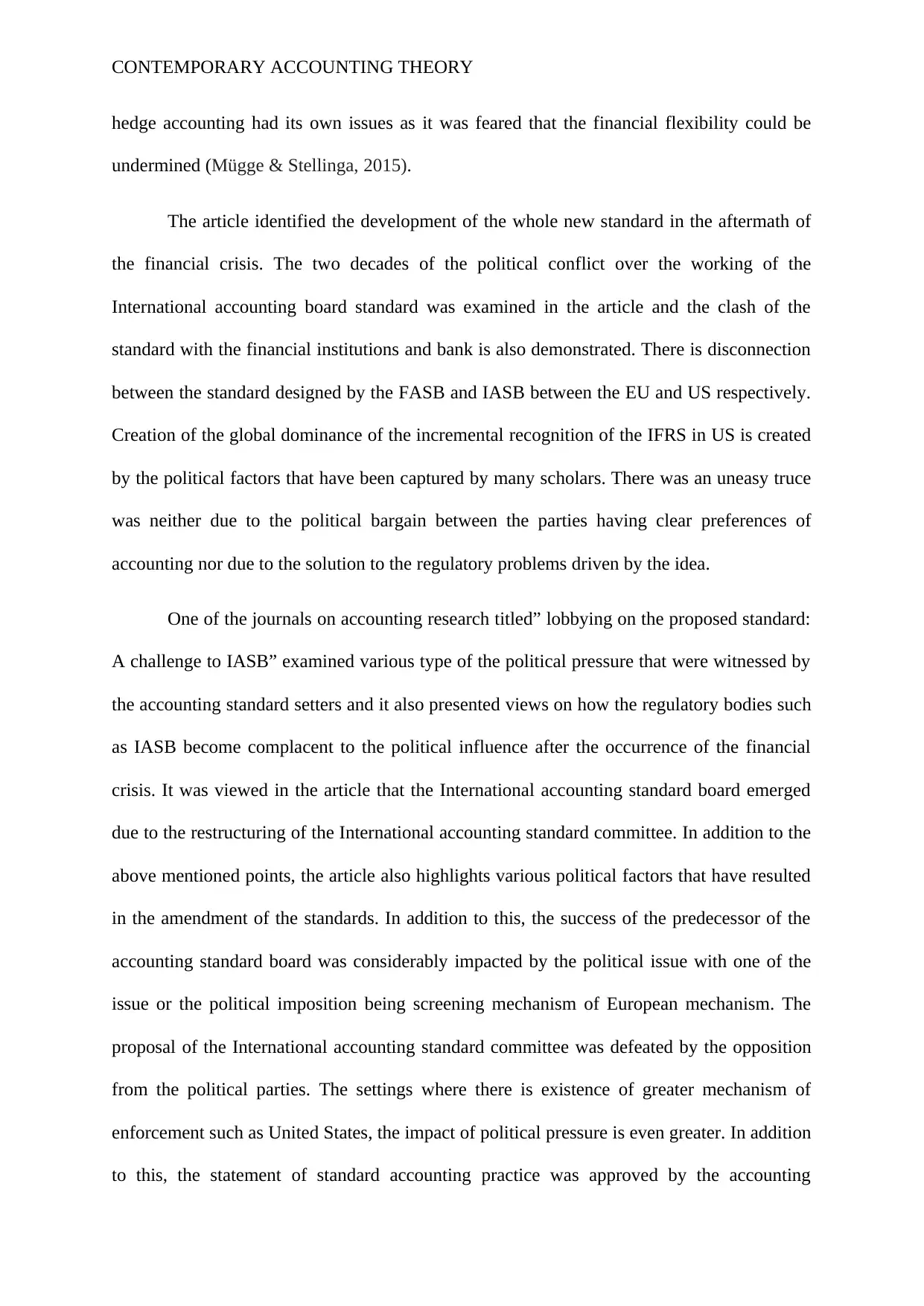
CONTEMPORARY ACCOUNTING THEORY
hedge accounting had its own issues as it was feared that the financial flexibility could be
undermined (Mügge & Stellinga, 2015).
The article identified the development of the whole new standard in the aftermath of
the financial crisis. The two decades of the political conflict over the working of the
International accounting board standard was examined in the article and the clash of the
standard with the financial institutions and bank is also demonstrated. There is disconnection
between the standard designed by the FASB and IASB between the EU and US respectively.
Creation of the global dominance of the incremental recognition of the IFRS in US is created
by the political factors that have been captured by many scholars. There was an uneasy truce
was neither due to the political bargain between the parties having clear preferences of
accounting nor due to the solution to the regulatory problems driven by the idea.
One of the journals on accounting research titled” lobbying on the proposed standard:
A challenge to IASB” examined various type of the political pressure that were witnessed by
the accounting standard setters and it also presented views on how the regulatory bodies such
as IASB become complacent to the political influence after the occurrence of the financial
crisis. It was viewed in the article that the International accounting standard board emerged
due to the restructuring of the International accounting standard committee. In addition to the
above mentioned points, the article also highlights various political factors that have resulted
in the amendment of the standards. In addition to this, the success of the predecessor of the
accounting standard board was considerably impacted by the political issue with one of the
issue or the political imposition being screening mechanism of European mechanism. The
proposal of the International accounting standard committee was defeated by the opposition
from the political parties. The settings where there is existence of greater mechanism of
enforcement such as United States, the impact of political pressure is even greater. In addition
to this, the statement of standard accounting practice was approved by the accounting
hedge accounting had its own issues as it was feared that the financial flexibility could be
undermined (Mügge & Stellinga, 2015).
The article identified the development of the whole new standard in the aftermath of
the financial crisis. The two decades of the political conflict over the working of the
International accounting board standard was examined in the article and the clash of the
standard with the financial institutions and bank is also demonstrated. There is disconnection
between the standard designed by the FASB and IASB between the EU and US respectively.
Creation of the global dominance of the incremental recognition of the IFRS in US is created
by the political factors that have been captured by many scholars. There was an uneasy truce
was neither due to the political bargain between the parties having clear preferences of
accounting nor due to the solution to the regulatory problems driven by the idea.
One of the journals on accounting research titled” lobbying on the proposed standard:
A challenge to IASB” examined various type of the political pressure that were witnessed by
the accounting standard setters and it also presented views on how the regulatory bodies such
as IASB become complacent to the political influence after the occurrence of the financial
crisis. It was viewed in the article that the International accounting standard board emerged
due to the restructuring of the International accounting standard committee. In addition to the
above mentioned points, the article also highlights various political factors that have resulted
in the amendment of the standards. In addition to this, the success of the predecessor of the
accounting standard board was considerably impacted by the political issue with one of the
issue or the political imposition being screening mechanism of European mechanism. The
proposal of the International accounting standard committee was defeated by the opposition
from the political parties. The settings where there is existence of greater mechanism of
enforcement such as United States, the impact of political pressure is even greater. In addition
to this, the statement of standard accounting practice was approved by the accounting
⊘ This is a preview!⊘
Do you want full access?
Subscribe today to unlock all pages.

Trusted by 1+ million students worldwide
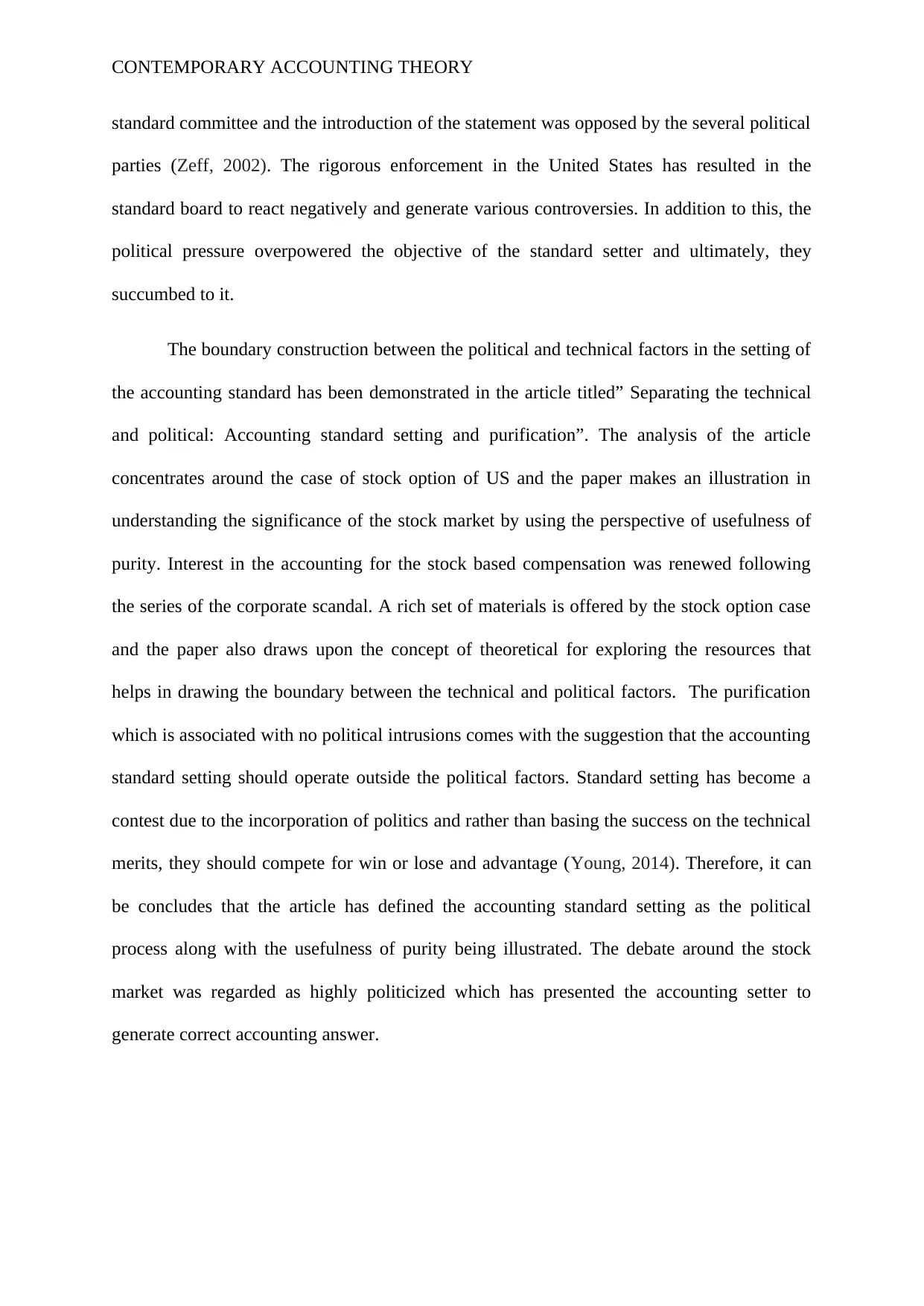
CONTEMPORARY ACCOUNTING THEORY
standard committee and the introduction of the statement was opposed by the several political
parties (Zeff, 2002). The rigorous enforcement in the United States has resulted in the
standard board to react negatively and generate various controversies. In addition to this, the
political pressure overpowered the objective of the standard setter and ultimately, they
succumbed to it.
The boundary construction between the political and technical factors in the setting of
the accounting standard has been demonstrated in the article titled” Separating the technical
and political: Accounting standard setting and purification”. The analysis of the article
concentrates around the case of stock option of US and the paper makes an illustration in
understanding the significance of the stock market by using the perspective of usefulness of
purity. Interest in the accounting for the stock based compensation was renewed following
the series of the corporate scandal. A rich set of materials is offered by the stock option case
and the paper also draws upon the concept of theoretical for exploring the resources that
helps in drawing the boundary between the technical and political factors. The purification
which is associated with no political intrusions comes with the suggestion that the accounting
standard setting should operate outside the political factors. Standard setting has become a
contest due to the incorporation of politics and rather than basing the success on the technical
merits, they should compete for win or lose and advantage (Young, 2014). Therefore, it can
be concludes that the article has defined the accounting standard setting as the political
process along with the usefulness of purity being illustrated. The debate around the stock
market was regarded as highly politicized which has presented the accounting setter to
generate correct accounting answer.
standard committee and the introduction of the statement was opposed by the several political
parties (Zeff, 2002). The rigorous enforcement in the United States has resulted in the
standard board to react negatively and generate various controversies. In addition to this, the
political pressure overpowered the objective of the standard setter and ultimately, they
succumbed to it.
The boundary construction between the political and technical factors in the setting of
the accounting standard has been demonstrated in the article titled” Separating the technical
and political: Accounting standard setting and purification”. The analysis of the article
concentrates around the case of stock option of US and the paper makes an illustration in
understanding the significance of the stock market by using the perspective of usefulness of
purity. Interest in the accounting for the stock based compensation was renewed following
the series of the corporate scandal. A rich set of materials is offered by the stock option case
and the paper also draws upon the concept of theoretical for exploring the resources that
helps in drawing the boundary between the technical and political factors. The purification
which is associated with no political intrusions comes with the suggestion that the accounting
standard setting should operate outside the political factors. Standard setting has become a
contest due to the incorporation of politics and rather than basing the success on the technical
merits, they should compete for win or lose and advantage (Young, 2014). Therefore, it can
be concludes that the article has defined the accounting standard setting as the political
process along with the usefulness of purity being illustrated. The debate around the stock
market was regarded as highly politicized which has presented the accounting setter to
generate correct accounting answer.
Paraphrase This Document
Need a fresh take? Get an instant paraphrase of this document with our AI Paraphraser
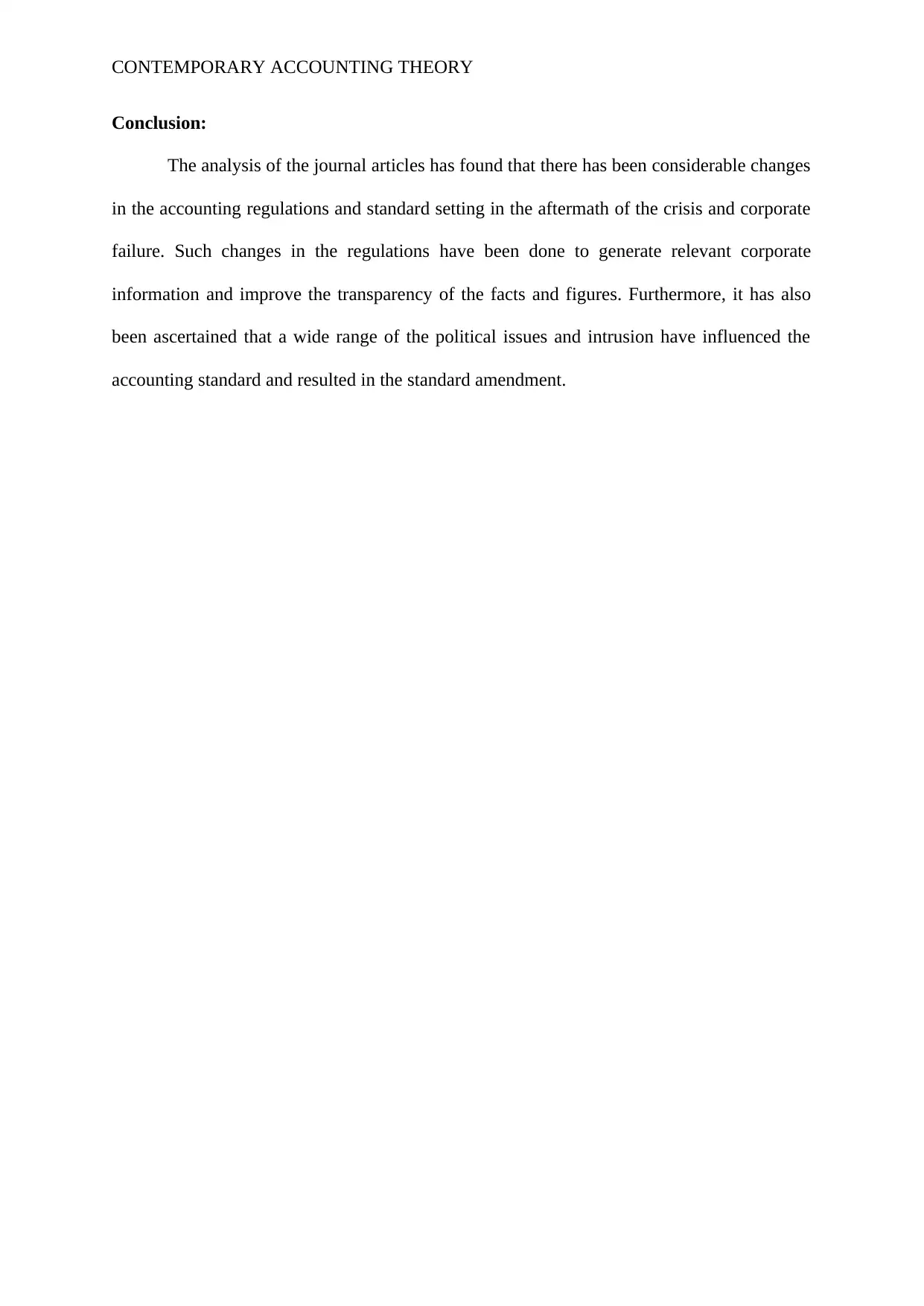
CONTEMPORARY ACCOUNTING THEORY
Conclusion:
The analysis of the journal articles has found that there has been considerable changes
in the accounting regulations and standard setting in the aftermath of the crisis and corporate
failure. Such changes in the regulations have been done to generate relevant corporate
information and improve the transparency of the facts and figures. Furthermore, it has also
been ascertained that a wide range of the political issues and intrusion have influenced the
accounting standard and resulted in the standard amendment.
Conclusion:
The analysis of the journal articles has found that there has been considerable changes
in the accounting regulations and standard setting in the aftermath of the crisis and corporate
failure. Such changes in the regulations have been done to generate relevant corporate
information and improve the transparency of the facts and figures. Furthermore, it has also
been ascertained that a wide range of the political issues and intrusion have influenced the
accounting standard and resulted in the standard amendment.
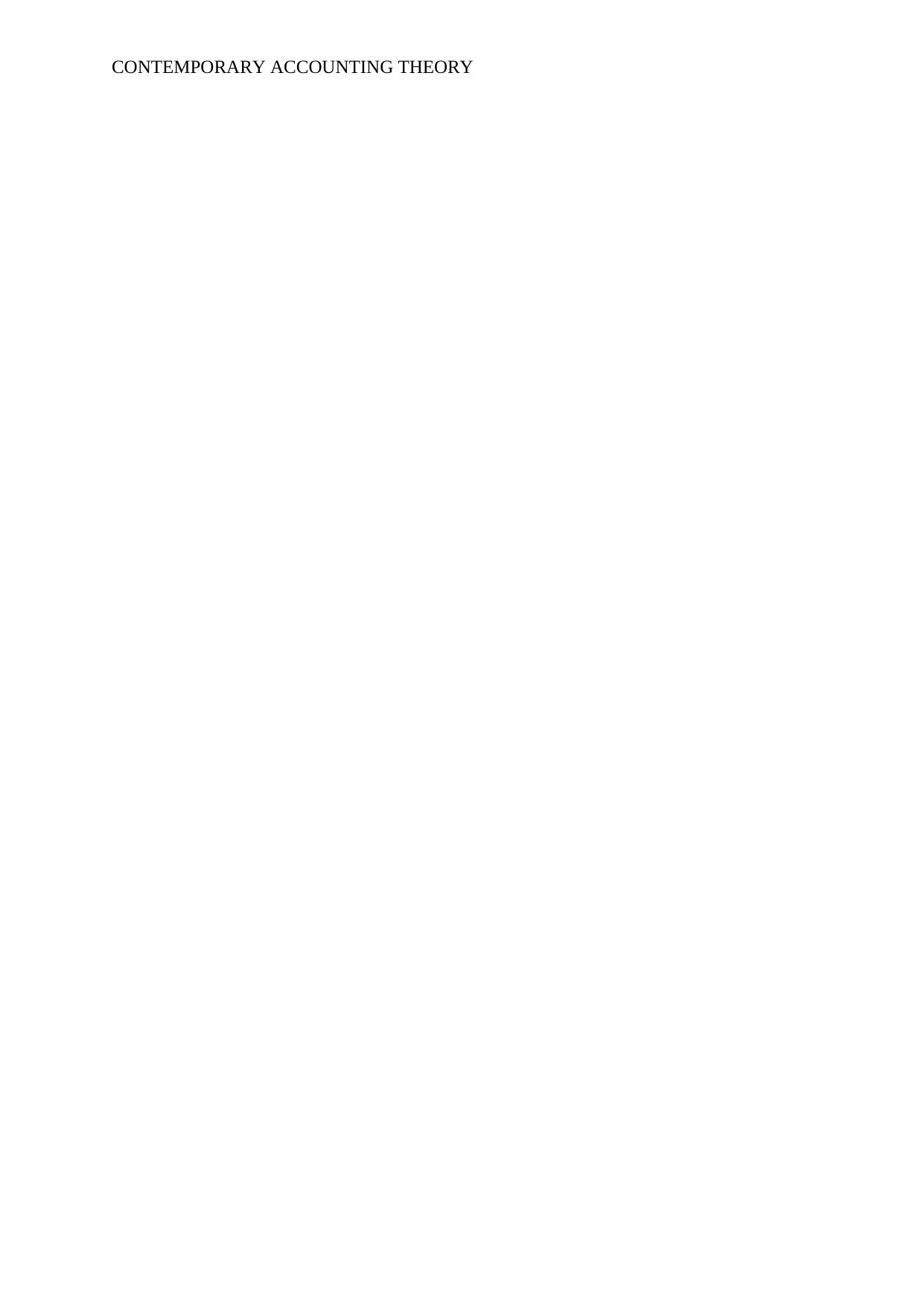
CONTEMPORARY ACCOUNTING THEORY
⊘ This is a preview!⊘
Do you want full access?
Subscribe today to unlock all pages.

Trusted by 1+ million students worldwide
1 out of 13
Related Documents
Your All-in-One AI-Powered Toolkit for Academic Success.
+13062052269
info@desklib.com
Available 24*7 on WhatsApp / Email
![[object Object]](/_next/static/media/star-bottom.7253800d.svg)
Unlock your academic potential
Copyright © 2020–2026 A2Z Services. All Rights Reserved. Developed and managed by ZUCOL.





